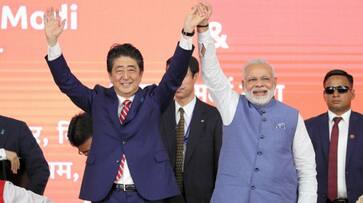The third item on the joint statement released at the end of Day Two of Modi’s visit took a swing at Beijing by calling for “a free and open Indo-Pacific” and their readiness “to expand concrete cooperation with US and other partners”
New Delhi: After doing a Modi on Narendra Modi by inviting him to his villa outside Tokyo on Sunday followed by lessons in chopstick culture, Japan’s Prime Minister Shinzo Abe appeared to redress the balance with India after a high profile visit to China.
The third item on the joint statement released at the end of Day Two of Modi’s visit took a swing at Beijing by calling for “a free and open Indo-Pacific” and their readiness “to expand concrete cooperation with US and other partners”.
Talks on a bilateral naval logistics agreement will begin shortly that will give both navies reciprocal access to the other’s naval bases and facilities. An “Implementing Agreement” will enhance cooperation between the two navies.
The statement reiterated some familiar phrases on freedom of navigation and overflight, unimpeded lawful commerce and peaceful resolution of international disputes as laid down in the Laws of the Sea. It was another snub aimed at China which has rejected the verdict of the international court that the South China Sea is not Beijing’s property.
Without naming China’s One Belt One Road, the joint statement called for “responsible debt financing practices” and commended the “collaborative projects between Japan and India in the Indo-Pacific. Their cooperation in Africa is expected to mature with the launch of a Platform for Japan India Business Cooperation in Asia-Africa Region.
Talks on a Currency Swap Agreement worth $75 billion will begin soon; this means wherever possible, the two countries will not use the US dollar but their respective currencies in bilateral trade. This would help India conserve its dollar reserves at a time when the uncertainties surrounding Donald Trump’s trade policies are growing.
Addressing the media late in the evening at the Prime Minister’s Office in Tokyo, Abe referred to cooperation in space and cyberspace and announced his country was joining Modi’s International Solar Alliance. Modi underscored his personal friendship with “Abe San” and lauded the 2+2 dialogue with Japan which has expanded the defence and security content in bilateral ties.
Now the hard work begins, implementing what the two leaders have agreed upon. Some of these ideas are already in the implementation stage, others may take time depending on what priority is accorded in either capital.
This article was originally published by Strategic News International
Last Updated Oct 30, 2018, 12:54 PM IST









![Salman Khan sets stage on fire for Anant Ambani, Radhika Merchant pre-wedding festivities [WATCH] ATG](https://static-gi.asianetnews.com/images/01hr1hh8y86gvb4kbqgnyhc0w0/whatsapp-image-2024-03-03-at-12-24-37-pm_100x60xt.jpg)
![Pregnant Deepika Padukone dances with Ranveer Singh at Anant Ambani, Radhika Merchant pre-wedding bash [WATCH] ATG](https://static-gi.asianetnews.com/images/01hr1ffyd3nzqzgm6ba0k87vr8/whatsapp-image-2024-03-03-at-11-45-35-am_100x60xt.jpg)


